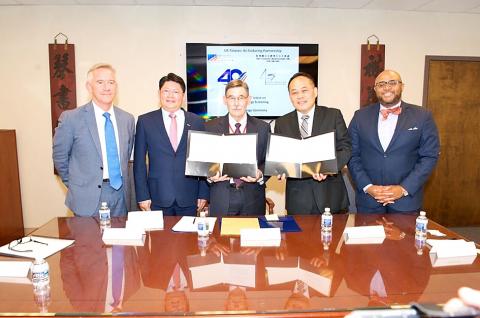US travelers transiting through Taiwan Taoyuan International Airport are to be exempt from having their checked baggage screened after the two nations exchanged letters of intent on one-stop security cooperation, the Ministry of Transportation and Communications said in a statement yesterday.
The letters were exchanged by American Institute of Taiwan (AIT) Washington Trade and Commercial Programs Director Rick Ruzicka and Deputy Representative to the US Louis Huang (黃敏境) at a ceremony at the AIT’s headquarters in Washington on Tuesday.
The event was witnessed by Deputy Minister of Transportation and Communications Huang Yu-lin (黃玉霖) and US Transportation Security Administration (TSA) Executive Adviser to the US Department of State Eric Sarandrea.

Photo courtesy of the Taipei Economic and Cultural Representative Office in the US
The exchange of letters of intent would facilitate flight transfers for US travelers and greatly enhance Taoyuan airport’s efficiency in serving transit passengers, the ministry said, adding that it is also a milestone in aviation security cooperation between the two nations.
TSA and Civil Aeronautics Administration officials have since March last year been cooperating to implement a one-stop security program for people transiting at Taoyuan from San Francisco International Airport or Seattle-Tacoma International Airport to exempt passengers’ checked baggage from screening.
Since the policy produced great results, the agencies began to discuss the possibility of including travelers from other US airports in the program, the ministry said.
Prior to the exchange ceremony, Louis Huang and AIT Washington Managing Director John Norris had signed an agreement on the expansion of the one-stop security program, it added.
The nation is also seeking to participate in the US Customs and Border Protection (CBP) preclearance project, the ministry said, adding that it would soon file an application to enter the project and conduct negotiations with US officials after CBP makes public the application procedures and criteria.
If Taoyuan airport is listed as a preclearance location, it would benefit anyone traveling from Taoyuan to the US or transiting through the nation, as they would not need to undergo a second CBP inspection upon arrival in the US, the ministry said, adding that this would help the travel industries in both nations.
Currently, Taiwanese traveling to or transiting through the US must have all of their luggage inspected at their airport of first entry before proceeding to their final destination.
The preclearance project excludes cargo shipments and focuses solely on passenger processing, which includes anything a traveler owns and is bringing with them to the US, such as their luggage, clothing, souvenirs, currency or other personal effects, according to the CBP Web site.

AGING: As of last month, people aged 65 or older accounted for 20.06 percent of the total population and the number of couples who got married fell by 18,685 from 2024 Taiwan has surpassed South Korea as the country least willing to have children, with an annual crude birthrate of 4.62 per 1,000 people, Ministry of the Interior data showed yesterday. The nation was previously ranked the second-lowest country in terms of total fertility rate, or the average number of children a woman has in her lifetime. However, South Korea’s fertility rate began to recover from 2023, with total fertility rate rising from 0.72 and estimated to reach 0.82 to 0.85 by last year, and the crude birthrate projected at 6.7 per 1,000 people. Japan’s crude birthrate was projected to fall below six,

US President Donald Trump in an interview with the New York Times published on Thursday said that “it’s up to” Chinese President Xi Jinping (習近平) what China does on Taiwan, but that he would be “very unhappy” with a change in the “status quo.” “He [Xi] considers it to be a part of China, and that’s up to him what he’s going to be doing, but I’ve expressed to him that I would be very unhappy if he did that, and I don’t think he’ll do that. I hope he doesn’t do that,” Trump said. Trump made the comments in the context

SELF-DEFENSE: Tokyo has accelerated its spending goal and its defense minister said the nation needs to discuss whether it should develop nuclear-powered submarines China is ramping up objections to what it sees as Japan’s desire to acquire nuclear weapons, despite Tokyo’s longstanding renunciation of such arms, deepening another fissure in the two neighbors’ increasingly tense ties. In what appears to be a concerted effort, China’s foreign and defense ministries issued statements on Thursday condemning alleged remilitarism efforts by Tokyo. The remarks came as two of the country’s top think tanks jointly issued a 29-page report framing actions by “right-wing forces” in Japan as posing a “serious threat” to world peace. While that report did not define “right-wing forces,” the Chinese Ministry of Foreign Affairs was

PREPAREDNESS: Given the difficulty of importing ammunition during wartime, the Ministry of National Defense said it would prioritize ‘coproduction’ partnerships A newly formed unit of the Marine Corps tasked with land-based security operations has recently replaced its aging, domestically produced rifles with more advanced, US-made M4A1 rifles, a source said yesterday. The unnamed source familiar with the matter said the First Security Battalion of the Marine Corps’ Air Defense and Base Guard Group has replaced its older T65K2 rifles, which have been in service since the late 1980s, with the newly received M4A1s. The source did not say exactly when the upgrade took place or how many M4A1s were issued to the battalion. The confirmation came after Chinese-language media reported